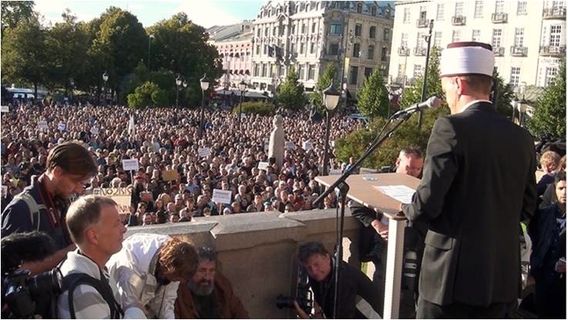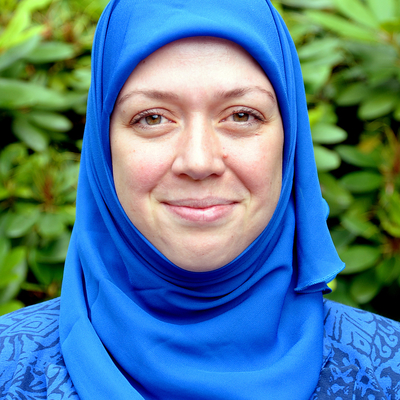From 11 to 13 October 2017, the international research conference Religious Minorities’ Self-Representations: Claims of Difference and Sameness in the Politics of Belonging was hosted by the Department of Philosophy and Religious Studies at Utrecht University. The aim of this conference was to explore how dominant perceptions of specific religious minorities feed into the ways in which these minorities represent themselves and/or their religion. In a series of blog posts, different conference participants write about their research. In this final blog, conference organiser and former team member Margreet van Es presents some findings from her Marie Skłodowska-Curie financed postdoctoral research project ‘Muslims Condemning Violent Extremism’.
In contemporary Western-European societies, Muslim minorities are under constant pressure to make explicit statements against violent extremism. Not only religious leaders, but also common citizens with a Muslim background are frequently asked about terrorism or ISIS, and politicians and opinion makers regularly urge Muslims to ‘take to the streets’ and ‘speak up’ against violent extremism. After the 9/11 attacks in 2001, an often used argument in public debate was that Muslims should take greater efforts to break prejudices against Muslims and Islam. As a result of the growing concern with ‘home-grown’ terrorism during the following years, an additional argument became that Muslims should make a positive contribution to counter-radicalisation efforts by de-legitimising violence committed in the name of Islam. Muslims and non-Muslims have repeatedly criticised such demands, because they perceive that Muslims are being held accountable for crimes they have not committed. Nevertheless, the pressure on Muslims to publicly denounce violent extremism has only increased after the rise of ISIS in 2014 and a series of attacks in European cities by ISIS-affiliated terrorists during the past few years.
The aim of my research project was to explore how Muslims in the Netherlands and Norway have responded to these demands since the 9/11 attacks, and to analyse statements made by Muslims against violent extremism in the light of the ‘culturalization of citizenship’ (Duyvendak et al. 2016) and the entailing ‘politics of belonging’ (Yuval-Davis 2006). How do Dutch and Norwegian Muslims deal with the ‘gaze of suspicion’ that is directed at them, and with the pressure they perceive to constantly prove that they are peaceful and loyal citizens? What motivates some Muslims to organise public protests against ISIS, whereas other Muslims openly refuse to make such statements despite cherishing equally little support for violent extremism? How do Muslims try to convey their message through different forms of media, and how are these statements received in society?
Whereas much scholarly attention is being paid to the discourses and practices through which Muslims are stigmatised and marginalised in European societies, comparatively little research has been conducted on the attempts made by Muslims to ‘talk back’ (bell hooks 1989). Furthermore, whereas much scholarly and public attention is being paid to the radicalisation of young Muslims, very little attention is being paid to the vast majority of Dutch Muslims who do not support violent extremism, but who face continuous pressure to ‘clarify their stance’ and to speak up against terrorism.
The project consisted of an exploration of recent developments in public debates in the Netherlands and Norway about the need for Muslims to denounce violent extremism, and in-depth case studies of specific initiatives taken by Dutch and Norwegian Muslims in the public sphere during the period 2001–2016. These case studies included, among others, a large protest march against ISIS that was organised by Norwegian Muslims in Oslo in August 2014, a poster campaign by Moroccan-Dutch Muslims living in Amsterdam against the murder of Theo van Gogh in 2004, and the social media campaign #NietMijnIslam (#NotMyIslam) that was started by five Moroccan-Dutch friends short after the Charlie Hebdo attacks in January 2015. Research was based on archival material (such as newspaper articles) and qualitative, semi-structured interviews with Muslim men and women who had played a key role in these initiatives.
My research results indicate that Muslims have spoken up against violent extremism far more often than what is commonly acknowledged in public debate. More importantly, my research shows that many statements made by Muslims against violent extremism can be seen as a ‘multiple critique’ (Cooke 2000), where Muslims not only criticise extremists who commit violence in the name of Islam, but where they also try to challenge stereotypical representations in Western societies of Islam as a violent religion. In addition, many Muslims who openly condemn violent extremism are highly critical of the often-repeated demand on Muslims to do so, and they try to make statements on their own terms and conditions. For example, some of the people I interviewed indicated that they do not mind speaking up against terrorism, but that they want to do this ‘as human beings’ and not ‘as Muslims’. Many of the interviewed men and women struggle between ‘striving for social cohesion’ and ‘criticising anti-Muslim racism’, and between ‘breaking stereotypes’ and ‘creating their own narratives without always having to relate to the stories told about Muslims and Islam by the dominant majority’.
Hence, my research findings raise the question what it means to ‘talk back’ when minorities are explicitly urged by the dominant majority to break stereotypes and prejudices. Furthermore, in studying the material aspects of specific initiatives taken by Muslims in the public sphere in support of peaceful interfaith coexistence, this project critically addresses how these efforts entail a need for the organisers to be recognisable as Muslims and thus to make their ‘Muslimness’ visible, while these efforts partly result from the pressure that is exerted on Muslims to prove that they are ‘normal’ citizens.
Last but not least, my research reveals how public debates about Islam and violence feed into Muslims self-representations, and how Muslim interventions in public debate about violent extremism do not only result from, but also contribute to the continuous reconstruction of religious beliefs. For example, stereotypical representations of Islam as a violent religion indirectly encourage Muslims to present Islam as a ‘religion of peace’. Hence, awareness of the dynamics between stereotypes and self-representations is of critical importance in future research on religious minorities.
References
Jan Willem Duyvendak, Peter Geschiere and Evelien Tonkens (2016). The Culturalization of Citizenship: Belonging and Polarization in a Globalising World. London: Palgrave Macmillan.
Bell Hooks (1989). Talking Back: Thinking Feminist, Thinking Black. Boston, MA: South End Press.
Miriam Cooke (2000). ‘Multiple Critique: Islamic Feminist Rhetorical Strategies’. Nepantla: Views from South 1 (1) 91–110.
Nira Yuval-Davis (2006). ‘Belonging and the Politics of Belonging’. Patterns of Prejudice 40 (3): 197–214.



